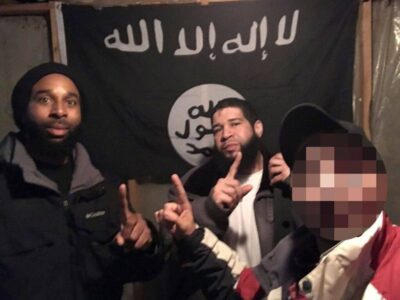
Illinois man sentenced to twelve years in federal prison for conspiring to assist Islamic State terrorist group
A man was sentenced Wednesday to 12 years in federal prison for attempting to aid the Islamic State terrorist group by providing cellphones to an undercover FBI agent to be used as detonators for bombs.
Joseph Jones, of Zion, Illinois, and his friend Edward Schimenti were convicted by a federal jury in 2019 of conspiracy to provide material support to a terrorist organization.
In handing down the sentence for Jones, U.S. District Judge Andrea Wood said that while any terrorism case is serious, the scheme that Jones was convicted of “was not of comparable severity” as many others.
“This is not a case where anyone claims Mr. Jones was actually planning on carrying out a terrorism attack,” Wood said.
Still, the lengthy sentencing hearing played out over two days beginning last month and included a tearful statement from Jones, who apologized for his “grave mistake.” But he also accused federal investigators of ensnaring him in an undercover operation by “preying on my sympathies.”
“Sometimes I feel like I have every reason to hate the government, but I don’t hate them,” Jones said. “I forgive them for what they’ve done.”
Jones also insisted he was never out to hurt anybody but simply “trying to be a good Muslim and a good American.”
“I consider myself a patriot,” he said in a voice choked with emotion. “I have my own view and my own beliefs, and it’s not about hatred.”
In asking for a 17-year sentence for Jones, Assistant U.S. Attorney Barry Jonas wrote in a court filing that although the friends were not planning to travel overseas themselves to fight, they celebrated the violence that ISIS perpetrated and believed they were assisting in it.
“The defendants deliberately attempted to assist an extremely violent terrorist group they knew was engaged in a wide range of atrocities,” Jonas wrote. “Not only were defendants aware of these atrocities, they celebrated them, gleefully watching horrific execution videos and sharing such ISIS propaganda online.”
Jones’ attorney, Patrick Boyle, had asked for a term of time served, which as of February was just under four years behind bars. In a lengthy court filing this week, Boyle described how Jones’ family life had deteriorated with his father’s drug addiction, leading him into his own problems with substance abuse and petty crime.
Jones found Islam as a teen and credits the religion with helping get him sober, Boyle said. But his continuing research on the formation of an Islamic state “took him to dark places on the internet,” including “slick” videos produced by ISIS that glorified attacks on civilians, which Jones does not condone.
“He believes that Islam never justifies violence against people who are just trying to live their lives,” Boyle wrote.
Renewing an argument from trial that Jones was entrapped by undercover FBI agents, Boyle said that Jones feels betrayed by the government and that “they pressured him into something he didn’t want to do.”
The case against Jones and Schimenti marked the only time so far Islamic State-related charges have gone to trial in Chicago, instead of ending with a guilty plea. The trial featured days of testimony about the group’s brutal tactics — including torture and beheadings — as well as its notorious propaganda campaigns aimed at impressionable Americans.
Jurors were shown one propaganda video found on Schimenti’s computer showing terrorists clad in all black standing behind six captured Kurdish fighters whispering prayers while on their knees. Prosecutors stopped the video as the terrorist narrating it in English held a large knife up to the throat of one of the captives.
The investigation began in September 2015 when an undercover agent posing as a motorist arrested in a traffic-related incident approached Jones at the Zion Police Department, where Jones was being interviewed about the recent slaying of a friend.
That agent introduced Jones and Schimenti to others posing as devotees of ISIS, including an informant they knew as Mohammed, who told them he was going to the Middle East to join the Islamic State ranks, according to prosecutors.
In February 2017, Schimenti took the informant to a gym in Zion to train for the battlefield. Remarking on his own weight problem, Schimenti said on an undercover recording that what mattered most in jihad was “hand-to-hand” combat skills, not physical fitness.
“Man, you know I’m all big, fat,” Schimenti said on the recording played for jurors. “But (God willing) the brothers will just have me be the one to cut the neck.”
Although the charges do not allege the two participated in any violence, Schimenti talked with the informant about future plans to attack Naval Station Great Lakes in North Chicago, a short distance from his home.
On April 7, 2017, Schimenti and Jones dropped off Mohammed at O’Hare International Airport equipped with cellphones they had purchased at his direction, according to the charges.
“Drench that land with they, they blood,” Schimenti allegedly said as he and Jones saw the man off at the airport.
Boyle told reporters he was “disappointed” that jurors rejected his argument of entrapment.
Both Boyle and attorneys for Schimenti had argued throughout the trial that the FBI targeted the pair because of their admittedly extremist views and then induced them to actively support terrorism through a series of undercover agents and informants.
“The government had my client under surveillance going back to 2015, including aerial surveillance,” Jones said. “Then they concocted a ruse to introduce an undercover (operative) and worked on him for almost two years.”
Source: Stripes





